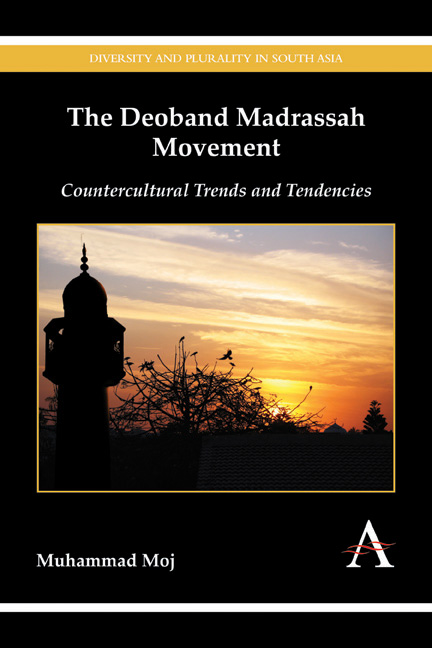Book contents
- Frontmatter
- Dedication
- Contents
- Preface
- Prologue
- Chapter 1 The Deoband Madrassah Movement: Research Context
- Chapter 2 Origin of the DMM: Seeds of a Counterculture
- Chapter 3 The DMM in United India: Activist Countercultural Trends
- Chapter 4 The DMM in Pakistan: Countercultural Politics and Extremism
- Chapter 5 Deobandi Islam: Countering Folk Islam and Popular Custom
- Chapter 6 The DMM versus Mainstream Society: Viewpoints of Deobandi Journals and Students
- Epilogue
- Appendix I The Deobandi Stance vis-à-vis Muslim Groups other than the Barelwis
- Appendix II Countercultural Exposition of the Deobandi Taliban
- Appendix III Interview Guide
- Glossary of Islamic Terms
- References
- Index
Chapter 4 - The DMM in Pakistan: Countercultural Politics and Extremism
Published online by Cambridge University Press: 05 December 2015
- Frontmatter
- Dedication
- Contents
- Preface
- Prologue
- Chapter 1 The Deoband Madrassah Movement: Research Context
- Chapter 2 Origin of the DMM: Seeds of a Counterculture
- Chapter 3 The DMM in United India: Activist Countercultural Trends
- Chapter 4 The DMM in Pakistan: Countercultural Politics and Extremism
- Chapter 5 Deobandi Islam: Countering Folk Islam and Popular Custom
- Chapter 6 The DMM versus Mainstream Society: Viewpoints of Deobandi Journals and Students
- Epilogue
- Appendix I The Deobandi Stance vis-à-vis Muslim Groups other than the Barelwis
- Appendix II Countercultural Exposition of the Deobandi Taliban
- Appendix III Interview Guide
- Glossary of Islamic Terms
- References
- Index
Summary
A counterculture is in one sense a far more radical rejection of a given society than any political movement, even one bent on revolutionary change.
Kenneth Westhues, Society's Shadow: Studies in the Sociology of Countercultures (1972, 34)This chapter discusses the history and evolution of the DMM in Pakistan while identifying different phases of the movement, marked by ascetic, activist and extremist trends. The chapter has been divided into four sections. The first section describes how a small group of Deobandis led by Allama Shabbir Ahmad Usmani actively campaigned to make Pakistan an Islamic state before being intercepted by the liberal and modernist leadership of the ruling Muslim League. After this initial failure, the DMM adopted an ascetic approach for some years before re-emerging in politics under new leadership. This section also highlights the role of the Deobandis in the Afghan jihad on the one hand and the DMM's growing links with the powerful military establishment of Pakistan on the other. The changing stances and strategies of the Deobandis in Pakistani politics are discussed in the second section. The third section elaborates the rise of extremism in the Deobandi movement after its involvement in Afghanistan. This section spotlights the links between the DMM and the Afghan Taliban as well as the countercultural nature of Deobandi militancy, which targeted sufi shrines as well as Shia Muslims in Pakistan. The final section sums up the countercultural tendencies of the Deobandi movement in Pakistan since 1947.
The Evolution of the DMM in Pakistan
After the creation of Pakistan, a small Deobandi faction that called itself All India Jamiat-ul-Ulama-e-Islam (AIJUI)) before partition organized itself in Karachi under the leadership of Allama Shabbir Ahmad Usmani in December 1947. Allama Usmani was supported by other Deobandi scholars such as Mufti Muhammad Shafi, Zafar Ahmed Usmani and Ehtishamul Haq Thanvi. This new party was named Markazi Jamiat-ul-Ulama-e-Islam (MJUI). This small group of Deobandis was very enthusiastic about turning Pakistan into a model Islamic state, which was their main reason to support the idea of Pakistan in the first place.
- Type
- Chapter
- Information
- The Deoband Madrassah MovementCountercultural Trends and Tendencies, pp. 91 - 118Publisher: Anthem PressPrint publication year: 2015



